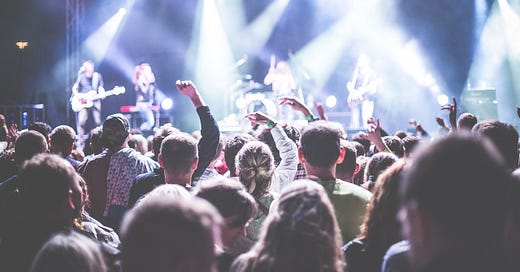Music is a Social Act
Music is a social act. Social aspects of music seem obvious at first blush, but social acts are nuanced and layered. Of course, I’ve mentioned my thoughts on music being political and spiritual acts. If either of those assertions are true, then by necessity, music is a social act. If people are involved, social acts abound. But what is a social act? Sociologist Max Weber explained that something is a social act when “the acting individual attaches subjective meaning to it.” (See Priya’s article here). By merely creating music, the artist attaches meaning to their work. Priya further explains “there can be no social action in isolation.” (Ibid.)
While it may be believed that music can be created in isolation, I argue that it cannot maintain isolation. The 21st century has brought with it technological advances that allow modern musicians to write, record, mix, master, and release their music worldwide from the comfort of their bedrooms (or basements, or garages). But the creation of music is only part of the equation. The minute anyone besides the creator(s) of the musical work hears the piece, we have a social act.
It is true that some music is created and “hidden” for years, sometimes decades, before another person hears it, in most cases it is eventually heard. This recalls proto-punk band Death, whose music was “rediscovered” after almost 30 years. Even well-known acts have “lost” unreleased albums. Prince is known to have multiple unreleased albums, with some estimates as high as up to 8000 songs. With the cultural impact Prince had; it is not unreasonable to assume these songs will eventually come to light (even if they are “leaked”).
The social actions that occur between musicians and audience are only one example. Musicians tend to congregate with each other. Frequently, they will bounce ideas off one another. Next to playing music, musicians love to discuss music both with other musicians and non-musicians alike. Whether the intent is to play, create, or merely discuss music, a social act happens that would not have if not for music.
Music offers a bridge where barriers normally exist. It is a language that builds on our commonalities even when our mother tongues differ. Musicians from different countries can step into the same room, with the same piece of music, and communicate with each other. They both understand what a quarter note is, what a key signature is, what the rudiments of a piece of music are. The notes on the staff play the same in any language.
Audiences can connect with music from different cultures, in different languages, and with a variety of subjective meanings. Whether the music contains lyrics or not, an individual can connect with a piece of music in ways that may not be easily expressed in words. Music unites us and provides commonalities when none are apparent. Music is universal. It cements us to each other in unpredictable ways. Of course, it does. Music is a social act.




